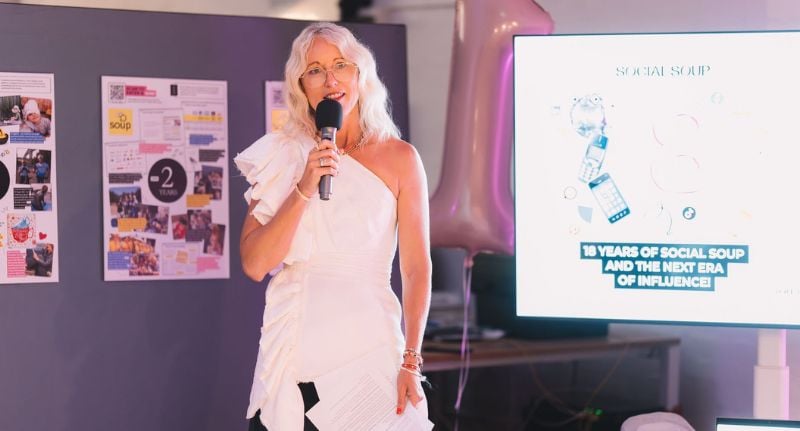Anyone who’s witnessed an 18th birthday in full swing knows the drill – a little nostalgia, a little chaos, a lot of reflection on how far someone’s come and how fast the world has changed around them.
Social Soup’s celebration in its Redfern office last night had the same energy.
A milestone for a company that helped invent an industry no one could quite name back in 2007 – and is now looking squarely at the next frontier.
The long road from bloggers to a $900m creator economy
Social Soup CEO Sharyn Smith – often called the pioneer of influencer marketing in Australia and New Zealand – stepped into the space before “influencer” was a job title, before Instagram, before anyone realised brand advocacy would become the bloodstream of modern marketing.
“I think it’s, it’s one of those things that it has changed a lot, but also some things have stayed the same,” Smith told Mediaweek. “In the beginning of what we began 18 years ago in the influence industry, which wasn’t really an industry in any shape or form.”
Back then, it was bloggers, forum moderators and real-world conversations. Word-of-mouth in the most literal sense.
“Back then, we began in the world of real world influence – people talking about products. How do we create conversations out there in the real world? We were working with bloggers. There was a little ecosystem of long form content out there, and also with forums.”
It’s a full circle twist Smith didn’t see coming
“With the launch of large language models and generative engine optimisation, we’re kind of back at forums again.”

The Instagram boom
The turning point came in 2010.
“When Instagram launched, that’s when we had this kind of burgeoning ecosystem of influences that began,” Smith said. “Before it was just bigger influences and bloggers, and then it exploded.”
In Australia, it exploded fast.
“There was a content creator for any possible niche you can imagine,” she said.
“This supply of influences began, and then, as the platforms evolved and allowed brands and businesses like ours to get more access to data and analytics, you could then give clients the sort of proof that they needed – that this was working, that this was reaching people.”
For Smith, that moment wasn’t just a commercial breakthrough – it was a philosophical one.
“It democratised media. It gave people the ability to have a greater influence than just within their social circles.”
The next wave: influence meets AI
The 18th anniversary arrives as Social Soup enters a new phase, partnering with global intelligence group Brandlight to tackle the rise of GEO – Generative Engine Optimisation.
With 72% of Australians now using AI assistants when shopping online, Smith sees influence shifting from the scroll to the search box – or, more accurately, to whatever sits behind the search box.
“Models are looking for how other people are talking about you,” she said. “They’re looking for how you’re showing up within reviews – so they’re now indexing social media. They’re looking at forums. Places like Reddit are now really potent sources of information.”
This isn’t SEO. It’s something more organic – and harder to control.
“They’re looking for pattern recognition,” she said. “They’re looking for how you’re being talked about, rather than a one-off thing that has great indexing that can now show up within Google.”
That’s where Brandlight comes in.
“We partnered with Brandlight because we could see they were global leaders in AI visibility,” Smith said.
“It’s so important as it allows brands to see how they’re showing up within the different models, and what sources are influencing how they show up within branded or unbranded search queries.”
Once brands understand that dynamic, they can act accordingly.
“It might be that YouTube is really influential,” she said. “If we hit these particular topic areas, that will show up and influence the model.”

Evergreen influence, cultural relevance and the long game
While AI is the new frontier, Smith says the fundamentals of influence – relevance, consistency, cultural currency – are unchanged.
“I think understanding trends is still very important. You want to be culturally relevant,” she said.
“It is that balance between evergreen influence infrastructure – what you’re tapping into that’s just kind of there – and then how you’re staying part of the conversation.”
For an industry built on speed and novelty, Smith’s longevity is rare. But it also says something: influence isn’t a fad; it’s an evolving language.
One Social Soup has been speaking since before the rest of the world caught on – and one it’s still helping brands learn as the terrain shifts again.
Eighteen years in, the industry is finally grown up. And Social Soup? Still reinventing the party.
